The British have an international reputation for their drinking.
Some of the biggest binge drinking in the world goes on in the UK, though at the same time, it’s certainly not as bad as you might have been led to believe.
In any case, one thing that has arisen out of this is an enormous lexicon of slang terms for drunk, from the funniest to the strangest and most obscure.
Today, we’re going to look at a selection of some of the best of these slang terms.
Let’s get started.
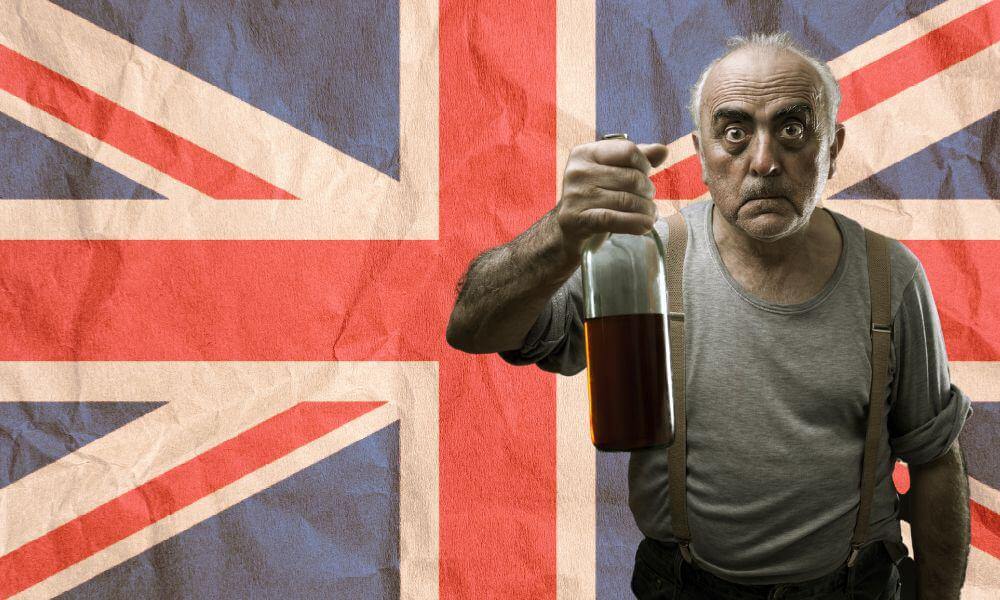
Leathered
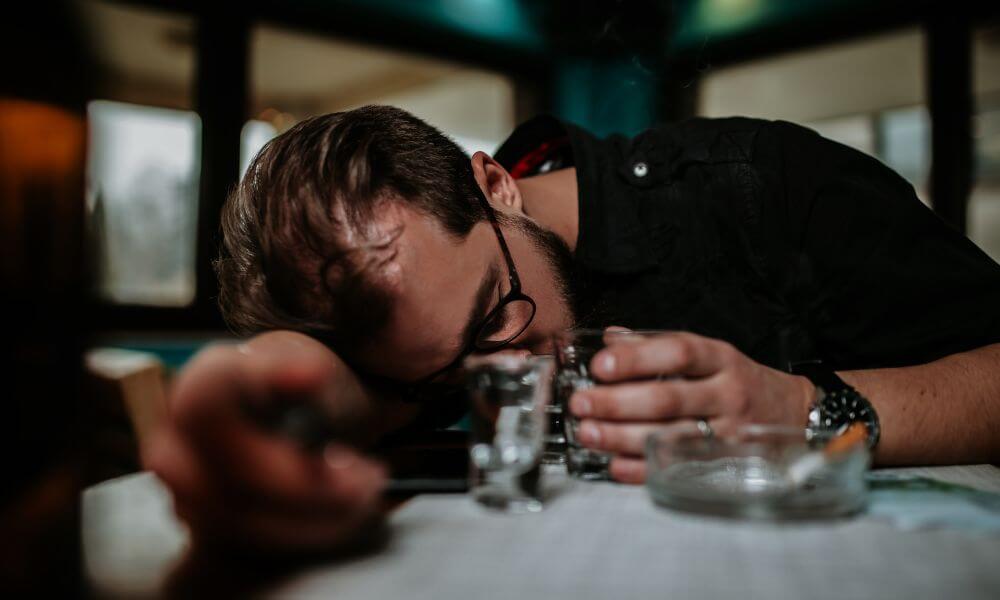
This is one of the most commonly used slang terms for drunk in Britain today.
And this one doesn’t just mean drunk—like most of the terms on this list, the best slang terms are those to describe someone who is really, excessively drunk.
Leathered is more or less universally understood throughout Britain if not necessarily used by everyone.
From Portsmouth on the south coast to Thurso on the north, British people understand what leathered means.
The origins of this term are likely in boxing.
Originally, boxing gloves in the 19th and early 20th Centuries were made from leather.
Over the years, veteran boxers would become “punch drunk”, meaning they’ve sustained head injuries from their boxing.
Thus, when someone is overly drunk, they are leathered.
Hammered
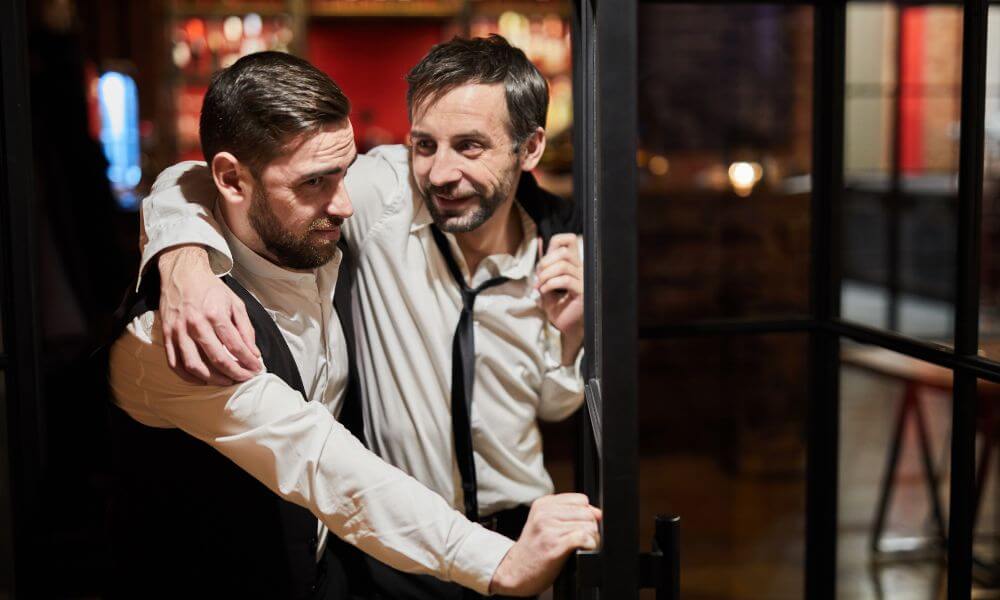
Hammered follows on quite nicely from leathered.
Again, if someone is hammered, they are over the line, and really, really drunk.
This is also another one that can be used just about anywhere in Great Britain, from London to Edinburgh.
It’s the kind of thing you are likely to hear out in the clubs rather than the quieter bars and pubs.
The origin of this term is a bit less clear.
There are at least two potential origins for the slang meaning.
One is a bit simpler: you are “hammered” because the feeling of being hungover the next day is like you’ve been hit many times with hammers.
On the other hand, it could have been a term used by tradesmen and craftsmen as far back as the 1700s who had been using a hammer all day.
This one is a little tenuous at best, and I personally would favor the above explanation.
Bladdered
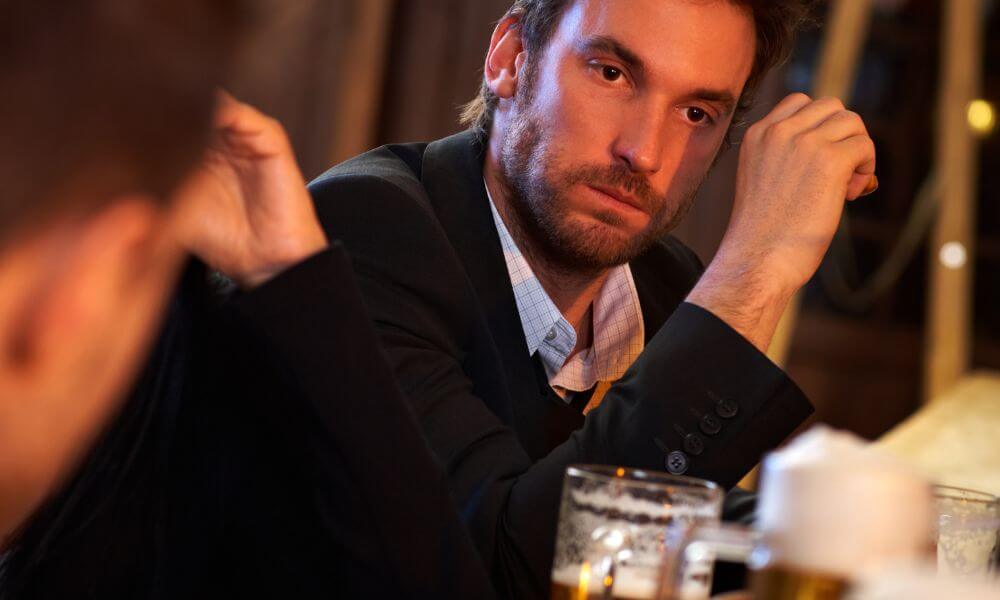
Finishing off our nice trio of verb slang terms for drunk we have bladdered.
Someone who is very drunk is bladdered, though perhaps you might argue that being bladdered is a slight step down from being hammered or leathered.
Bladdered could just mean coming home at 11pm after a few too many pints and heading to bed.
Leathered or hammered is staying out till 3am and passing out on a park bench.
This is up for debate, though.
While this term is now broadly British as well, it was and still is originally most likely an Irish term.
The meaning I think is quite self-explanatory.
When someone drinks a lot of alcohol, they put a lot of pressure on their bladder!
Thus, drinking means you are bladdered.
Legless
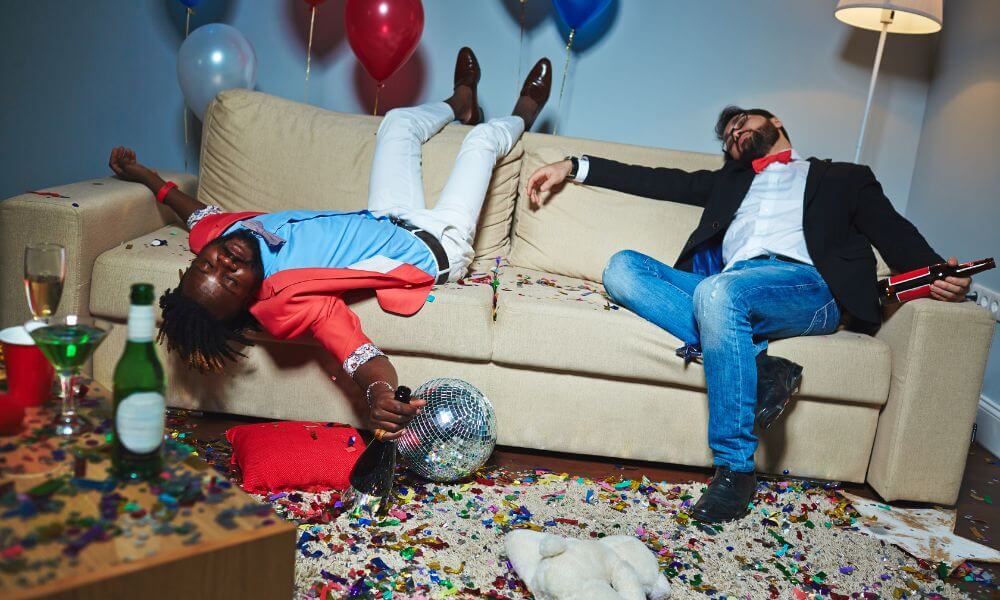
Next we have legless, another really common term to describe someone who is past the point of even hammered or leathered.
While this slang term is broadly distributed throughout Britain, it is more prominent in parts of southern England than anywhere else.
It’s a more specifically regional term in that sense.
But, again, any British person who hears this will know what it means.
Again, I think the meaning and origin of this one is fairly clear.
Someone who is so drunk that they are not able to walk or use their legs anymore—they are legless.
The phrase dates back at least as far as the 1920s when we find even newspaper reports discussing “legless” drunks in the saloons.
Off your face
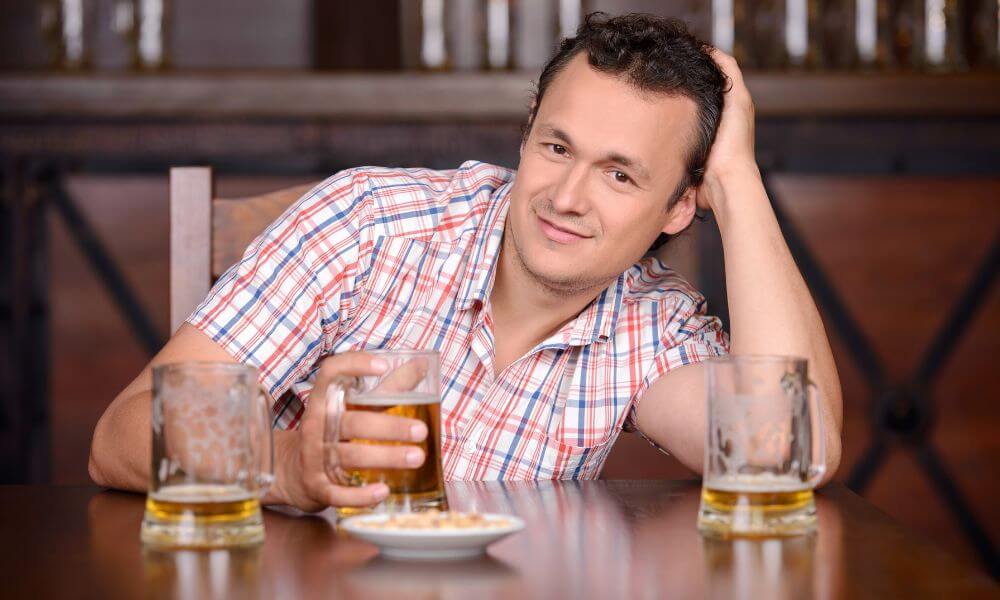
There are a few slight variations of this one, but this is by far the most common.
To be off your face is to, again, be so drunk that you don’t really know what you’re doing.
You’re out of your normal mind—and we’ve all seen the face of a very drunk person.
It’s often completely different from their ordinary face!
In terms of the origin of this phrase, it’s again not really clear.
“Off your face” to mean somehow intoxicated, whether on alcohol or other drugs, has been around for some time.
It seems pretty intuitive to understand how such a phrase would come to be used.
Written records date back to the middle of the 20th Century, so presumably it was in use some time before that.
We just can’t be sure.
Off your chops
As I said, there are quite a few variations of the above phrase.
One of them is “off your chops”. In parts of the UK, “chops” is slang for someone’s mouth or their jaws.
For instance, “I got a terrible smack in the chops.” Thus, being “off your chops” when drunk means you are so drunk that, again, your face is showing it.
Plastered
Again, this is one of the more well-known and understood slang terms for drunk in the UK: plastered.
This is a good catch-all for varying levels of being very drunk.
Again, you might just be stumbling home after a few drinks at the pub, or you could be outside a kebab shop while the sun’s coming up after a night of dancing.
There are multiple possible origins for this slang term.
We first see it in print around the turn of the 20th Century.
One simple if rather offensive potential origin is that Irish people were commonly plasterers around this time, and they also had a reputation for being heavy drinkers.
This one is rather tenuous at best.
Another theory suggests its origin is in the fact that stale beer used to be used in plaster mix, and even that medicinal kinds of plaster were mixed with alcohol.
It also simply meant, in Middle English, to be soaked in a liquid.
So, it’s much more likely that the meaning was a medical one.
Sloshed
Following on nicely from plastered, next we have sloshed.
This one will certainly sound a bit strange to your ears if you haven’t grown up in the UK.
Indeed, I would even say large parts of the UK might have to take a moment to understand this one.
To be sloshed is to be very drunk.
So, like the previous entry, the term seems to originate from an older sense of simply being soaked in a liquid, or to splash around in a liquid.
Or for that liquid to simply splash around haphazardly.
Sometime in the 1940s, we find the first recorded use of this slang term to mean very drunk.
The sense was most likely the fact that you have a lot of alcohol “sloshing” around inside you when you’ve had a lot to drink.
Thus, you are sloshed.
Wellied
As you can see, the British love these sorts of slang terms—take a normal noun and turn it into a verb.
Wellied is another example, and though perhaps a bit of an archaic one, an important example, nonetheless. “She was totally wellied the other night!” for example.
In British slang, “welly” is less about the footwear and more about giving something some power.
“Give it some welly,” you might say before someone kicked a football.
So, to be wellied just means to be extremely, you might say powerfully, drunk.
Trolleyed
Expressions like this are at least in perception the most quintessentially British kinds of slang for drunk.
Being trolleyed means you’re extremely drunk, for instance, “I was completely trolleyed last night.”
Again, there are no half-measures here—if you were described as trolleyed, whether by yourself or your friends, you may have had just one too many drinks!
Seemingly, the term was originally a slang term among students and seems to be a rather recent addition to the list of slang terms for drunk.
We first find it in the 1990s in print, and it seems to have arisen out of a simple tradition of using nouns and turning them into verbs to convey drunkenness.
It is also thought that because of the way shopping trolleys can tend to wobble, it may be in reference to this.
Off your trolley
Just to add on to that last one and to add another to the list of “off your X” from earlier, we have “off your trolley”.
Again, the meaning is the same as the previous one, you’ve simply constructed the phrase in a different way, really.
You’ve lost control because of the amount you’ve drank, and thus you are off your trolley.
This one emerges around the same time that “trolleyed” does.
Drunk as a lord
In pretty much any English-speaking country, and indeed in other languages, slang terms for drunk are going to arise out of comparisons with things from that nation.
In the United States, you might get “drunk as a skunk”, for instance.
There are no skunks in the UK, but there are lords!
This one really speaks for itself, though it is very old in origin.
It seems to have been proverbial by the middle of the 17th Century, when a lord still meant someone who was an actual, landed baron with a great deal of wealth.
Thus, the lords could drink a lot more than the common folk simply because they could afford to.
So, when you got very drunk, you were drunk as a lord.
Perhaps a bit old-fashioned now but certainly still used.
Drunk as a fart
Now, this one is a great one to use and is a very common expression to mean very drunk, but there are a few layers of slang we’re going to need to explain here.
In modern slang, “fart” obviously means a couple of things, but it can also be a slightly derogatory way to refer to an old person: “That old fart,” for example.
This is likely what most have in their minds when they tell their friend it’s time to go home: “You’re drunk as a fart, I’ll get you a taxi.”
There are conflicting accounts about where this term originates.
Some believe it is simply a reference to how little the elderly sometimes need to drink to get drunk.
The OED suggests the term originated in the 1990s, though other sources place it as far back as the 60s.
It certainly is likely that the term in spoken English far predates our first recorded usage of it.
Merry
This is one of the few on this list that does not mean to be completely out of your mind drunk—to be merry is that initial period after your first few drinks when you’re feeling great and you’re still coherent.
This is when people tend to feel really happy and jolly and are glad to be there.
It might sound like you’re just describing their mental state, but again, most British people will understand this is a specific reference to how drunk you are.
We’ve no real sense of where this originates, as it’s very hard to track the slang usage of such an old word. It was in use in the simple sense of happy and jolly by at least the 14th Century and no doubt far earlier than that.
It may have originated during Christmas celebrations which were, even in the medieval days, a time for drinking and feasting.
Regardless, this one is a really old term.
Tipsy
Now, this one may not be strictly British as it is used in many places.
But is most assuredly British in origin.
Tipsy again refers to a specific period of drunkenness, early on, when you’ve perhaps had one or two drinks and you’re starting to feel the effects ever so slightly.
Surprisingly, this one is also much older than you might think. in the 1500s, the word tipple was someone who sold alcohol in retail.
The origin of that word is not clear, though it may be Scandinavian. In any case, by the 1570s, it had come to mean slightly drunk in a similar sense as drowsy.
This is how it was ultimately passed down to us.
In his/her cups/bottles
This one is a rather archaic one, but no doubt in use in plenty of places with a greater hold on tradition and the past.
Naturally, the meaning is pretty explicit with this one.
To be in your cups or in your bottles means you’ve been spending long hours drinking.
This was a common expression in the 19th Century and is found in novels such as Thomas Hardy’s The Return of the Native.
This one often meant not only drunk but was reserved specifically for alcoholics.
Blotto
Another really old term here, next up we have “blotto”.
This one is definitely another regional one, and you won’t hear this said all over the UK.
Only in specific parts, and it’s generally more of a southern English term.
There are a couple of theories about when it originated, though the meaning is quite clear.
The first suggests that it originated in the First World War, where it was recorded in a book of slang terms written in a war hospital at the time.
Another theory suggests it is far older, as the term “blot” was coined in the 1500s to mean blotting ink to cover up a word or something you had written.
Thus, the idea was that someone who was very drunk had absorbed a lot of alcohol in the same way paper absorbs blots of ink.
Jingled
Another archaic one first recorded in this dictionary of slang terms by Lance-Corporal War Muir in his slang book, “jingled” is one of dozens of terms he heard being used to mean drunk.
To be jingled means only to be slightly drunk, and no doubt relates back to the earlier term “merry”.
It’s probably a festive season term, someone who is slightly drunk over Christmas dinner, perhaps.
Less used today, but still a good one to break out when your uncle has had one too many sherries on Christmas eve.
Oiled
As you likely know, for a machine to be oiled means it’s working effectively—being achieved by literally covering its moving parts in oil.
Thus, “oiled” is another somewhat archaic term meaning drunk. In fact, this one means very drunk, and though the precise origin isn’t clear, it may be northern English in origin.
The idea is that you are lubricated with lots of alcohol—thus, you’re oiled up.
By its very nature we can pretty reliably assume it originated shortly after the Industrial Revolution, when oiled up machines were a common sight in the workplace.
Tanked to the wide
This is one is, most certainly, an archaic one and not really used much today.
It’s another one recorded first during the First World War, and though you might think for this reason that it has something to do with army tanks, this is most likely not the case.
Firstly, though, the meaning is simply that you are drunk to a very great degree.
It is likely associated with the idea of the “drunk tank”—where police would throw local drunks to sleep it off after disorderly behavior.
Thus, being drunk is being “tanked”, and “to the wide” is simply an expression of the degree to which you are drunk.
Well sprung
Yet another from the treasure trove recorded to us in the Lance-Corporal’s invaluable book, next we have “well sprung,” a simple expression meaning drunk.
The origin is unfortunately lost to time, and we have no real way of knowing when it entered the language—except, of course, that it was sometime before the First World War.
In any case, the sense is easy to intuit.
A well spring is an abundant source of something, literally meaning a spring of water, but metaphorically came to mean a good source of anything.
“He’s a wellspring of knowledge,” for instance.
So, you might say “He’s gone and gotten himself well sprung” to mean someone is quite drunk.
Up the pole
This phrase certainly has more than one meaning, but perhaps chief among them is someone who’s very drunk. In Irish slang, it also meant someone is pregnant, or even just a bit angry.
All the meanings of the term appear to have their origin in the 19th Century, though it’s really not clear where or when precisely.
The sense is generally that someone who is “up the pole” is in trouble or difficulty of some kind.
Someone who is too drunk, then, is up the pole.
You won’t hear this one a great deal anymore, but it’s not unheard of.
Squiffy
Squiffy is definitely an older term, but it has seen a revival in recent years—even if we might call that revival “ironic”.
It’s ironic in the sense that people now use this term in a humorous way, meaning to have a little fun at their own expense. “You’re squiffy!” for example.
It was in common use in the 19th Century, and eventually fell out of use some time in the middle of the 20th Century.
It was also rather something that was associated with the upper classes in their fancy dinner parties, as opposed to the working classes in the taverns.
Wrecked
To finish off with a couple of more modern terms, next we have wrecked.
This one may be fairly old in word origin but is again becoming one of the more commonly used slang terms for drunk again.
I would think the idea is pretty clear. Someone who is extremely drunk is wrecked, and they can’t handle themselves anymore.
This one can also mean intoxicated by other drugs, too.
Beer goggles
Finally, we have this strange idea of “beer goggles”.
This is a reference to the idea that your vision becomes blurred and you generally look at the world in a different way after you’ve had a few beers.
The term originated in an edition of Playboy magazine, in a rather sexist notion that doesn’t bear repeating here.
In any case, it came to be a euphemism for the lack of faculties of a very drunk person.
The list, I’m sure you’ve guessed, could go on.
The British are good at two things: drinking and coming up with fantastic slang.
These are some of the most common, some of the lesser known, some of the old fashioned and some of the just plain weird slang terms for drunk in Britain.
You’re likely to hear at least one of these if you spend any time involved with British nightlife, so now you don’t have to be confused about what they mean.
More in British Slang
- British Slang For Alcohol
- British Slang For Angry
- British Slang For Argument
- British Slang For Bad
- British Slang For Boss
- British Slang For Boy
- British Slang For Breasts
- British Slang For Butt
- British Slang For Car
- British Slang For Cat
- British Slang For Child
- British Slang For Cigarette
- British Slang For Coffee
- British Slang For Cold
- British Slang For Cool
- British Slang For Delicious
- British Slang For Diarrhea
- British Slang For Dog
- British Slang For Drunk
- British Slang For Easy
- British Slang For Expensive
- British Slang For Eyes
- British Slang For Face
- British Slang For Fat Person
- British Slang For Fist Fight
- British Slang For Flatulence
- British Slang For Food
- British Slang For Friend
- British Slang For Girl
- British Slang For Glasses
- British Slang For Going To Bed
- British Slang For Good
- British Slang For Good Luck
- British Slang For Goodbye
- British Slang For Gossip
- British Slang For Grandmother
- British Slang For Gun
- British Slang For Hair
- British Slang For Happy
- British Slang For Head
- British Slang For Helicopter
- British Slang For Hello
- British Slang For Horny
- British Slang For House
- British Slang For Hungry
- British Slang For Hurry Up
- British Slang For Husband
- British Slang For Idiot
- British Slang For Jail
- British Slang For Jerk
- British Slang For Job
- British Slang For Kiss
- British Slang For Knife
- British Slang For Loser
- British Slang For Lover
- British Slang For Lying
- British Slang For Menstruation
- British Slang For Money
- British Slang For Motorcycle
- British Slang For Mouth
- British Slang For No
- British Slang For Nonsense
- British Slang For Nose
- British Slang For Pajamas
- British Slang For Party
- British Slang For Police
- British Slang For Poor
- British Slang For Potato
- British Slang For Pregnant
- British Slang For Rain
- British Slang For Relax
- British Slang For Rich
- British Slang For Sailor
- British Slang For Sandwich
- British Slang For Scared
- British Slang For Sexy
- British Slang For Shoes
- British Slang For Silly
- British Slang For Soldier
- British Slang For Stomach
- British Slang For Surprised
- British Slang For Tea
- British Slang For Teeth
- British Slang For Telephone
- British Slang For Television
- British Slang For Testicles
- British Slang For Thank You
- British Slang For Thief
- British Slang For Tired
- British Slang For Toilet
- British Slang For Umbrella
- British Slang For Vacation
- British Slang For Vomit
- British Slang For Walking
- British Slang For Weird
- British Slang For Wife
- British Slang For Wonderful
- British Slang For Work
- British Slang For Yes
- British Slang Insults
- British Slang Quiz

